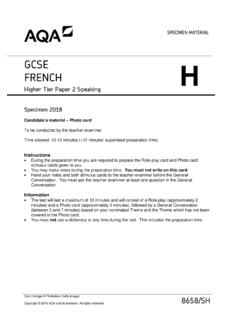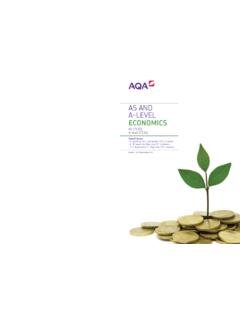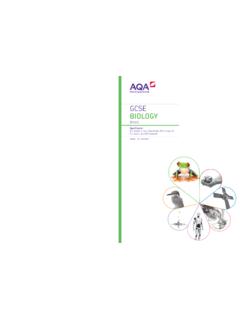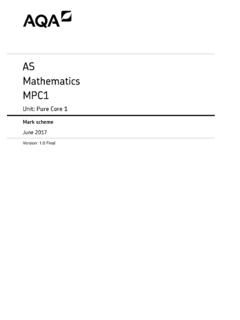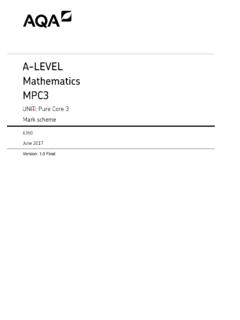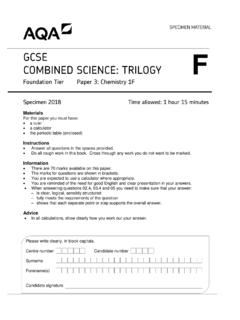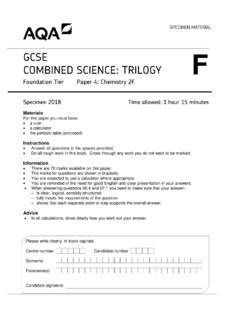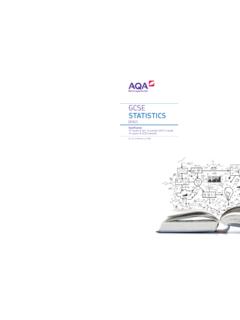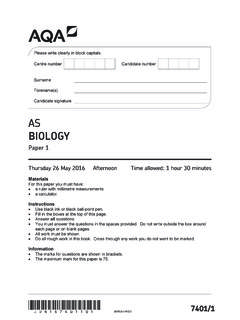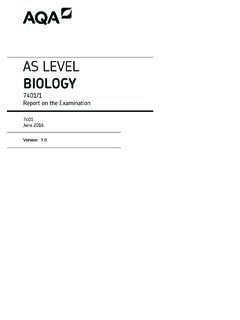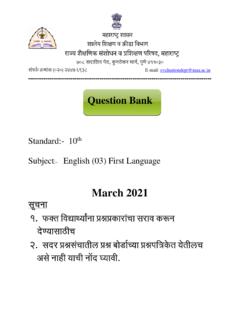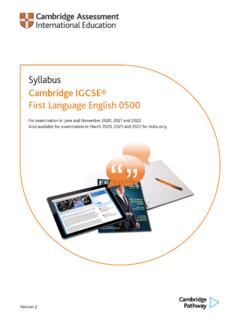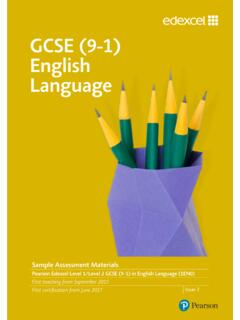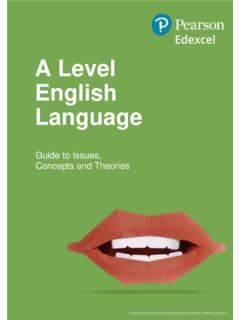Transcription of Get help and support GCSE ENGLISH E: english …
1 GCSEENGLISH language (8700)SpecificationFor teaching from September 2015 onwardsFor exams in May/June 2017 onwardsVersion 1 July 2016 Copyright 2016 AQA and its licensors. All rights retains the copyright on all its publications, including the specifications. However, schools and colleges registered with AQA are permitted to copy material from this specification for their own internal Education (AQA) is a registered charity (number 1073334) and a company limited by guarantee registered in England and Wales (company number 3644723). Our registered address is AQA, Devas Street, Manchester M15 help and supportVisit our website for information, guidance, support and resources at can talk directly to the GCSE ENGLISH subject teamE: 0161 953 75043 GCSE ENGLISH language (8700). For exams May/June 2017 onwards.
2 Version for the most up-to-date specifications, resources, support and administrationContents1 Introduction Why choose AQA for GCSE ENGLISH language support and resources to help you teach 62 Specification at a glance 83 Subject content Scope of study 104 Scheme of assessment Aims and learning outcomes Explorations in creative reading and writing Writers viewpoints and perspectives Non-exam assessment Assessment objectives Assessment weightings 175 Non-exam assessment administration Avoiding malpractice Teacher standardisation Internal standardisation Submitting marks Moderation After moderation 206 General administration Entries and codes Overlaps with other qualifications Awarding grades and reporting results Re-sits and shelf life Previous learning and prerequisites Access to
3 Assessment: diversity and inclusion Working with AQA for the first time Private candidates 234 Visit for the most up-to-date specifications, resources, support and administrationAre you using the latest version of these specifications? You will always find the most up-to-date version of this specification on our website at We will write to you if there are significant changes to this ENGLISH language (8700). For exams May/June 2017 onwards. Version for the most up-to-date specifications, resources, support and administration1 Why choose AQA for GCSE ENGLISH LanguageA specification designed for you and your studentsOur assessments have been designed to inspire and motivate students, providing appropriate stretch and challenge whilst ensuring, as far as possible, that the assessment and texts are accessible to the full range of specification will enable students of all abilities to develop the skills they need to read, understand and analyse a wide range of different texts covering the 19th, 20th and 21st century time periods as well as to write clearly, coherently and accurately using a range of vocabulary and sentence and engaging contentThe specification offers the attraction of two equally-balanced papers.
4 Relating reading sources to the topic and theme of writing tasks. The reading sources act as stimulus for writing tasks, providing students with a clear route through each paper has a distinct identity to better support high quality provision and engaging teaching and learning. Paper 1, Explorations in Creative Reading and Writing, looks at how writers use narrative and descriptive techniques to engage the interest of readers. Paper 2, Writers' Viewpoints and Perspectives, looks at how different writers present a similar topic over approach to spoken language (previously speaking and listening) will emphasise the importance of the wider benefits that speaking and listening skills have for students. The endorsed unit will draw on good practice to suggest how engaging formative tasks can lead to a single summative approachThe specification offers a skills-based approach to the study of ENGLISH language in an untiered context.
5 Questions are designed to take students on an assessment journey through lower tariff tasks to more extended language and Literature togetherThe specification is fully co-teachable with GCSE ENGLISH Literature. Students who choose to study both will benefit from the transferable skills developed across the two re behind you every step of the wayAfter careful consultation with practising teachers, subject associations and employers, we have designed the specification to meet the needs of students and teachers, providing high quality assessment and good provision for ENGLISH . It offers excellent preparation for AS and A-level ENGLISH , as well as equipping students with essential life-skills and the best progression route to future AQA you can rest assured that your students will receive the grade that fairly represents their attainment and reflects the skills that they have can find out about all our ENGLISH qualifications at for the most up-to-date specifications, resources, support and support and resources to help you teachWe know that support and resources are vital for your teaching and that you have limited time to find or develop good quality materials.
6 So we ve worked with experienced teachers to provide you with a range of resources that will help you confidently plan, teach and prepare for resourcesWe have too many ENGLISH language resources to list here so visit to see them all. They include: ENGLISH language reading support booklet. This will include a wide range of texts from the 19th, 20th and 21st century and some suggested teaching activities to support you in preparing students for the reading sections of both papers a KS3 resource about 19th century texts helping you to develop progression through KS3 into KS4 a digital anthology which will include resources to support the teaching of ENGLISH language and ENGLISH Literature provision of resources to teach speaking and listening skills, in recognition of the wider benefits that these skills have for your students marked and annotated student responses to the questions on our specimen papers with senior examiner commentaries Subject Advocates who will support you in the transition to the new specification and facilitate local and regional network and update meetings student textbooks and digital resources that have been checked and endorsed by AQA training courses to help you deliver AQA GCSE ENGLISH language and GCSE ENGLISH Literature qualifications subject expertise courses for all teachers.
7 From newly-qualified teachers who are just getting started to experienced teachers looking for fresh for examsVisit for everything you need to prepare for our exams, including: past papers, mark schemes and examiners reports specimen papers and mark schemes for new courses Exampro: a searchable bank of past AQA exam questions exemplar student answers with examiner your students' results with Enhanced Results Analysis (ERA)Find out which questions were the most challenging, how the results compare to previous years and where your students need to improve. ERA, our free online results analysis tool, will help you see where to focus your teaching. Register at information about results, including maintaining standards over time, grade boundaries and our post-results services, visit ENGLISH language (8700).
8 For exams May/June 2017 onwards. Version for the most up-to-date specifications, resources, support and administrationKeep your skills up to date with professional developmentWherever you are in your career, there s always something new to learn. As well as subject-specific training, we offer a range of courses to help boost your skills: improve your teaching skills in areas including differentiation, teaching literacy and meeting Ofsted requirements help you prepare for a new role with our leadership and management can attend a course at venues around the country, in your school or online whatever suits your needs and availability. Find out more at help and supportVisit our website for information, guidance, support and resources at You can talk directly to the ENGLISH language subject teamE: 0161 953 75048 Visit for the most up-to-date specifications, resources, support and administration2 Specification at a glanceSubject content1 Explorations in creative reading and writing (page 13)2 Writers' viewpoints and perspectives (page 13)3 Non-exam assessment (page 14)For the award of the GCSE in ENGLISH language students must offer all three ENGLISH language (8700).
9 For exams May/June 2017 onwards. Version for the most up-to-date specifications, resources, support and administrationAssessmentsAll texts in the examination will be Assessment: Spoken LanguageWhat's assessed(AO7 AO9) presenting responding to questions and feedback use of standard EnglishAssessed teacher set throughout course marked by teacher separate endorsement (0 % weighting of GCSE)Paper 2: Writers' Viewpoints and PerspectivesWhat s assessedSection A: Reading one non-fiction text and one literary non-fiction textSection B: Writing writing to present a viewpointAssessed written exam: 1 hour 45 minutes 80 marks 50 % of GCSEQ uestionsReading (40 marks) (25 %) two linked texts 1 short form question (1 x 4 marks) 2 longer form questions (1 x 8, 1 x 12 marks) 1 extended question (1 x 16 marks)Writing (40 marks) (25 %) 1 extended writing question (24 marks for content, 16 marks for technical accuracy)++Paper 1: Explorations in Creative Reading and WritingWhat's assessedSection A: Reading one literature fiction textSection B: Writing descriptive or narrative writingAssessed written exam.
10 1 hour 45 minutes 80 marks 50 % of GCSEQ uestionsReading (40 marks) (25 %) one single text 1 short form question (1 x 4 marks) 2 longer form questions (2 x 8 marks) 1 extended question (1 x 20 marks)Writing (40 marks) (25 %) 1 extended writing question (24 marks for content, 16 marks for technical accuracy)10 Visit for the most up-to-date specifications, resources, support and administration3 Subject contentStudents will draw upon a range of texts as reading stimulus and engage with creative as well as real and relevant contexts. Students will have opportunities to develop higher-order reading and critical thinking skills that encourage genuine enquiry into different topics and specification will ensure that students can read fluently and write effectively. Students will be able to demonstrate a confident control of standard ENGLISH and write grammatically correct sentences, deploying figurative language and analysing GCSE ENGLISH language students should.
